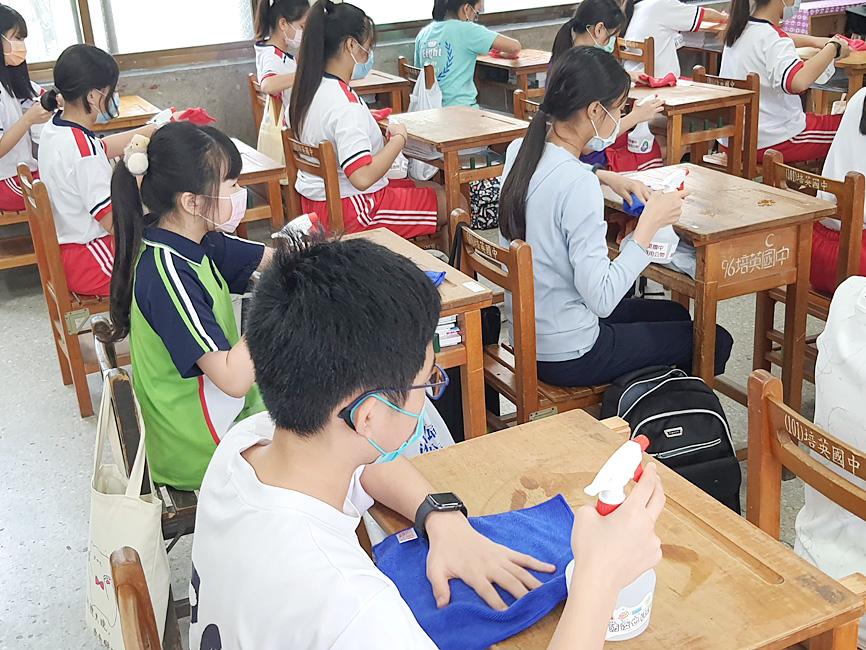Enrollment at Taiwanese schools is to decline sharply over the next 16 years, a Ministry of Education report released yesterday said.
The report, which uses historic data and predictive modeling to cover enrollment trends from 2010 to 2036, is used to guide education policy, resource distribution and curriculum plans, it said.
Enrollment at elementary schools is to decline by 16,000 students per year, falling to fewer than 1 million by 2029 and to 923,000 by 2036, it said.

Photo: Hung Mei-hsiu, Taipei Times
The downward trend has been correlated to births since 2010, it said, adding that policy interventions and the belief in certain Chinese zodiac signs have affected the birthrate in some years.
Many couples avoid giving birth in the Year of the Tiger, which fell on 2010 and is to occur again next year, the report said.
In 2010, 215,000 students enrolled in elementary schools, which fell to 175,000 the following year, it said.
The figure rose in 2018 to 214,000 due to a spike in births in 2012, which the report attributed to government policies and the Year of the Dragon, it said.
These policies have since maintained enrollment at elementary schools at more than 20,000 students, it added.
However, first-year enrollment at elementary schools is expected to fall next year, while the rate of decline for the 26-year period is projected to be 29.6 percent, it said.
Over the next 16 years, enrollment at junior-high schools is forecast to decline by 8,200 students, or 1.5 percent per year, it said.
The figure includes an annual loss of 2,100 first-year students and 3,400 graduating students, it said.
Enrollment at high schools and vocational schools is to decline by 9,700, or 1.7 percent per year, including an annual loss of 3,000 first-year students and 3,600 graduating students, it said.
The overall population of vocational and high-school students would fall to 500,000 students in 2036, it said.
Universities would have 11,000 fewer students each year starting next year, and the student population would fall to 828,000 in 2036, the report added.

MAKING WAVES: China’s maritime militia could become a nontraditional threat in war, clogging up shipping lanes to prevent US or Japanese intervention, a report said About 1,900 Chinese ships flying flags of convenience and fishing vessels that participated in China’s military exercises around Taiwan last month and in January have been listed for monitoring, Coast Guard Administration (CGA) Deputy Director-General Hsieh Ching-chin (謝慶欽) said yesterday. Following amendments to the Commercial Port Act (商港法) and the Law of Ships (船舶法) last month, the CGA can designate possible berthing areas or deny ports of call for vessels suspected of loitering around areas where undersea cables can be accessed, Oceans Affairs Council Minister Kuan Bi-ling (管碧玲) said. The list of suspected ships, originally 300, had risen to about 1,900 as

Right-wing political scientist Laura Fernandez on Sunday won Costa Rica’s presidential election by a landslide, after promising to crack down on rising violence linked to the cocaine trade. Fernandez’s nearest rival, economist Alvaro Ramos, conceded defeat as results showed the ruling party far exceeding the threshold of 40 percent needed to avoid a runoff. With 94 percent of polling stations counted, the political heir of outgoing Costa Rican President Rodrigo Chaves had captured 48.3 percent of the vote compared with Ramos’ 33.4 percent, the Supreme Electoral Tribunal said. As soon as the first results were announced, members of Fernandez’s Sovereign People’s Party

MORE RESPONSIBILITY: Draftees would be expected to fight alongside professional soldiers, likely requiring the transformation of some training brigades into combat units The armed forces are to start incorporating new conscripts into combined arms brigades this year to enhance combat readiness, the Executive Yuan’s latest policy report said. The new policy would affect Taiwanese men entering the military for their compulsory service, which was extended to one year under reforms by then-president Tsai Ing-wen (蔡英文) in 2022. The conscripts would be trained to operate machine guns, uncrewed aerial vehicles, anti-tank guided missile launchers and Stinger air defense systems, the report said, adding that the basic training would be lengthened to eight weeks. After basic training, conscripts would be sorted into infantry battalions that would take

GROWING AMBITIONS: The scale and tempo of the operations show that the Strait has become the core theater for China to expand its security interests, the report said Chinese military aircraft incursions around Taiwan have surged nearly 15-fold over the past five years, according to a report released yesterday by the Democratic Progressive Party’s (DPP) Department of China Affairs. Sorties in the Taiwan Strait were previously irregular, totaling 380 in 2020, but have since evolved into routine operations, the report showed. “This demonstrates that the Taiwan Strait has become both the starting point and testing ground for Beijing’s expansionist ambitions,” it said. Driven by military expansionism, China is systematically pursuing actions aimed at altering the regional “status quo,” the department said, adding that Taiwan represents the most critical link in China’s